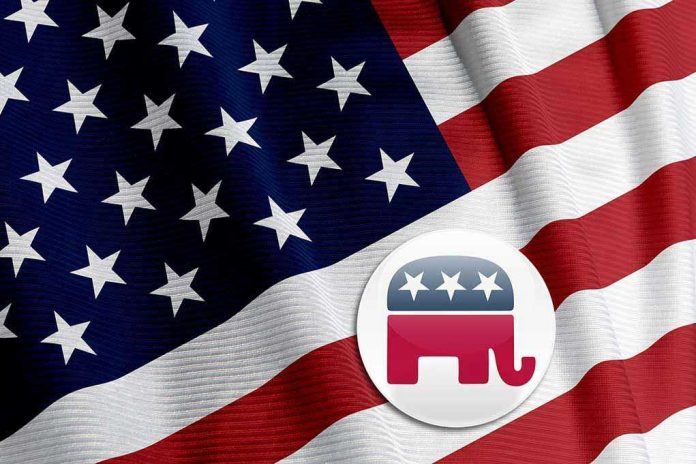
Musk’s explosive feud with Trump and the GOP has shattered the illusion of conservative unity, sending shockwaves through the 2026 election landscape and leaving Republican senators openly sweating over the prospect of a third-party revolt that could hand Congress right back to the left.
At a Glance
- Elon Musk’s public split with Trump over government spending sparks the creation of the America Party, threatening to fracture the conservative vote.
- Senate Republicans are deeply worried that Musk’s third-party insurgency could cost them their slim majority in the 2026 midterms.
- Third-party efforts in America have mostly failed before, but Musk’s financial firepower and social reach make this a real threat to the two-party status quo.
- The Forward and Libertarian parties are circling Musk, eager to collaborate and amplify their own anti-establishment agendas.
GOP Faces Political Earthquake as Musk Launches America Party
Elon Musk, the billionaire whose Twitter fingers send Wall Street and politicians alike into cold sweats, has officially torched the Republican “big tent” by launching his own America Party. This comes just days after President Trump signed the so-called “Big, Beautiful Bill”—a monstrosity that promises to balloon the national debt by trillions, betraying every last fiscal conservative who ever voted red in hopes of some common sense. Musk, never one to bite his tongue or shy from a brawl, declared the GOP “lost to big spenders,” and with a single social media poll, rallied over a million followers to demand a new party. The result? More than 65% said, “Yes, Elon, please, for the love of liberty, give us an alternative to this circus.”
Now, with the 2026 midterms looming like a guillotine over Capitol Hill, Senate Republicans are in full panic mode. Their razor-thin majority is under siege—not from Democrats, but from a Musk-fueled third-party juggernaut. The America Party is already targeting vulnerable Senate seats and key House districts, promising to siphon off the votes of fed-up patriots who actually care about balanced budgets and constitutional sanity. GOP leadership, no strangers to backroom deals and empty promises, suddenly find themselves scrambling to appease both the Trump loyalists and the Musk insurgents, lest they lose it all to the left on a split ballot.
Third-Party Thunderclap: Why This Isn’t Another Vanity Project
Historically, third parties in America have been as enduring as campaign bumper stickers—think Ross Perot’s Reform Party or Andrew Yang’s Forward Party, both swept aside by the entrenched two-party machine. But Musk is a different animal. He’s not some billionaire dabbling in politics for sport; he’s got a war chest, a legion of online followers, and a knack for bending the news cycle to his will. While most third-party dreams die at the altar of ballot access and media apathy, Musk’s America Party is already in talks with the Forward and Libertarian parties to build a coalition that could fundamentally disrupt the 2026 midterms. If anyone can break the two-party lockdown, it’s a guy with more money than most countries and an ego to match.
The America Party’s stated mission? Fiscal sanity, government accountability, and real representation for the millions of Americans sick to death of being ignored by both sides. With public disgust at politicians reaching an all-time high—possibly only rivaled by the disgust at inflation, open borders, and endless government handouts to illegal immigrants—the soil is fertile for a populist revolt. Musk’s move is a direct response to the GOP’s cave-in on spending, and his message is clear: If Republicans won’t defend conservative values, he’ll do it himself.
The Stakes: Senate Control, Conservative Values, and the Future of the Two-Party System
The 2026 midterms are shaping up as a do-or-die moment for conservatives. With Republicans holding the Senate by a whisker, Musk’s entry could split the vote just enough to hand control back to the Democrats—an outcome that would be catastrophic for anyone still clinging to the hope of constitutional government and fiscal restraint. Senate Republicans, aware of the history of third-party spoilers, are openly fretting that Musk’s America Party will cost them the chamber. Meanwhile, Democrats are licking their lips at the prospect of a divided right, eager to resume their agenda of reckless spending, border chaos, and woke social engineering.
But the implications go far beyond 2026. If Musk succeeds in building a viable political alternative, it could finally crack the two-party cartel that has strangled American democracy for generations. Sure, the odds are long—ballot access is a nightmare, and the media establishment will do everything in its power to marginalize the new party. But with public trust in politicians at rock bottom, and the appetite for disruption at an all-time high, the ground is shifting. The very fact that the Forward and Libertarian parties are lining up to collaborate with Musk is proof that the establishment is facing a threat it hasn’t seen in decades.



